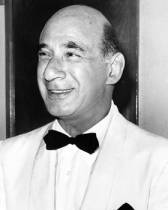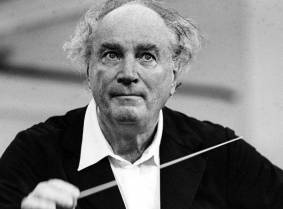
William Steinberg (Cologne, August 1, 1899 – New York City, May 16, 1978) William Steinberg was born in Cologne where his musical experience began at home with lessons on the piano and violin. After entering the Cologne Conservatory he received training in conducting with Hermann Abendroth, piano with Lazzaro Uzielli, and theory with Franz Bolsche. Steinberg graduated with distinction in 1920, having been awarded the Wullner Prize for conducting. Subsequently he became an assistant to Otto Klemperer at the Cologne Opera, whom he succeeded in 1924 as principal conductor. In turn Steinberg began to appear at a variety of important venues in Europe, including engagements in Czechoslovakia at the German theater in Prague. As with virtually all major conductors of the period, Steinberg gradually worked his way up the opera-house ladder which culminated with his appointment as maestro of the Frankfurt Opera in 1929. While at that post Steinberg conducted the first public performance of Arnold Schoenberg's opera Von Heute auf Morgen in 1930. But given his ancestry, after Steinberg began to accept invitations as guest conductor of the Berlin Philharmonic the Nazi regime had him removed from his Frankfurt post. In 1933 he was henceforth restricted to conducting all-Jewish orchestras which would be allowed to perform only for the audiences of the Jewish Culture League. Finally, in 1936 he took the bold step of emigrating to Palestine where, with Bronislav Hubermann, he formed what is now the Israel Philharmonic. It was shortly after that dramatic juncture that he encountered the legendary Arturo Toscanini who noted Steinberg's unusual gifts and invited the young maestro to become the Associate Conductor of the NBC Symphony Orchestra where he served from 1938 through 1941. Following a variety of guest appearances in the U.S. during World war II Steinberg was named permanent guest conductor of the San Francisco Opera in 1944, where he served through 1948. But along the way Steinberg was also attracted to the podium of the Buffalo Philharmonic, largely through the efforts of the versatile and industrious Cameron Baird (who at the time was the Chairman of the UB Music Department). During his tenure as Music Director of the Buffalo Philharmonic (from 1945 until 1953) Steinberg initiated many changes in the orchestra's personnel, including the beginning of an influx of extraordinary players from Europe who, like Steinberg himself, sought new lives and careers here in the United States just after the War. Their presence on stage - primarily in the strings - had a lot to do with the distinctly European sound which began to resonate from the BPO during the late 40's and continued throughout the 50's. To this of course was added Steinberg's relentless demand for impeccable performance. The time frame and timbre of the Orchestra is handsomely preserved on the BPO's first commercial recording, the "Leningrad" Symphony No.7 by Dimitri Shostakovich on the Musicraft label. It is fair to say that Steinberg's success in Buffalo sparked the remainder of his extraordinary career. He began his long tenure as Music Director of the Pittsburgh Symphony Orchestra in 1952, during which time he was also the principal conductor of the London Philharmonic. From 1964 through 1968 Steinberg also served as the senior guest conductor of the New York Philharmonic, after which he became the Music Director of the Boston Symphony Orchestra, a post he held until 1972. In the course of his long career Steinberg directed the world premieres of several important works including the ballet suite Billy the Kid by Aaron Copland, Lukas Foss' Choral Symphony and Roger Sessions' Symphony No.8. Today a significant portion of his wide discography has been made available on CDs including his important recordings of the masterworks of Beethoven, Bruckner, Borodin and Mussorgsky. Additional Steinberg reissues feature the virtuosity of Jasha Heifetz, Nathan Milstein and Vladimir Horowitz, among others. 
Rafael Jeroným Kubelík (29 June 1914 – 11 August 1996) Son of a well-known violinist, Jan Kubelík, he was trained in Prague, and made his debut with the Czech Philharmonic Orchestra at the age of 19. Having managed to maintain a career in Czechoslovakia under the Nazi occupation, he refused to work under what he considered a "second tyranny" after the Communist Czechoslovak coup d'état of 1948, and took refuge in Britain. He became a Swiss citizen in 1967. Kubelík was music director of the Chicago Symphony Orchestra (1950–53), musical director of The Royal Opera, Covent Garden (1955–58), and music director of the Bavarian Radio Symphony Orchestra (1961–79), and was a frequent guest conductor for leading orchestras in Europe and America. As a composer, Kubelík wrote in a neo-romantic idiom. His works include five operas, three symphonies, chamber music, choral works, and songs. *********************************** Felix Mendelssohn Bartholdy Symphony No. 4 in A major, Op. 90 Ludwig van Beethoven Symphony No. 5 in C minor, Op. 67 Boston Symphony Orchestra William Steinberg 07.09.1964 (broadcast) Wolfgang Amadeus Mozart Symphony No. 26 in E-flat major, K. 184/161a Gustav Mahler Symphony No. 9 Boston Symphony Orchestra Rafael Kubelík 21.01.1967 (broadcast) *********************************** | 
